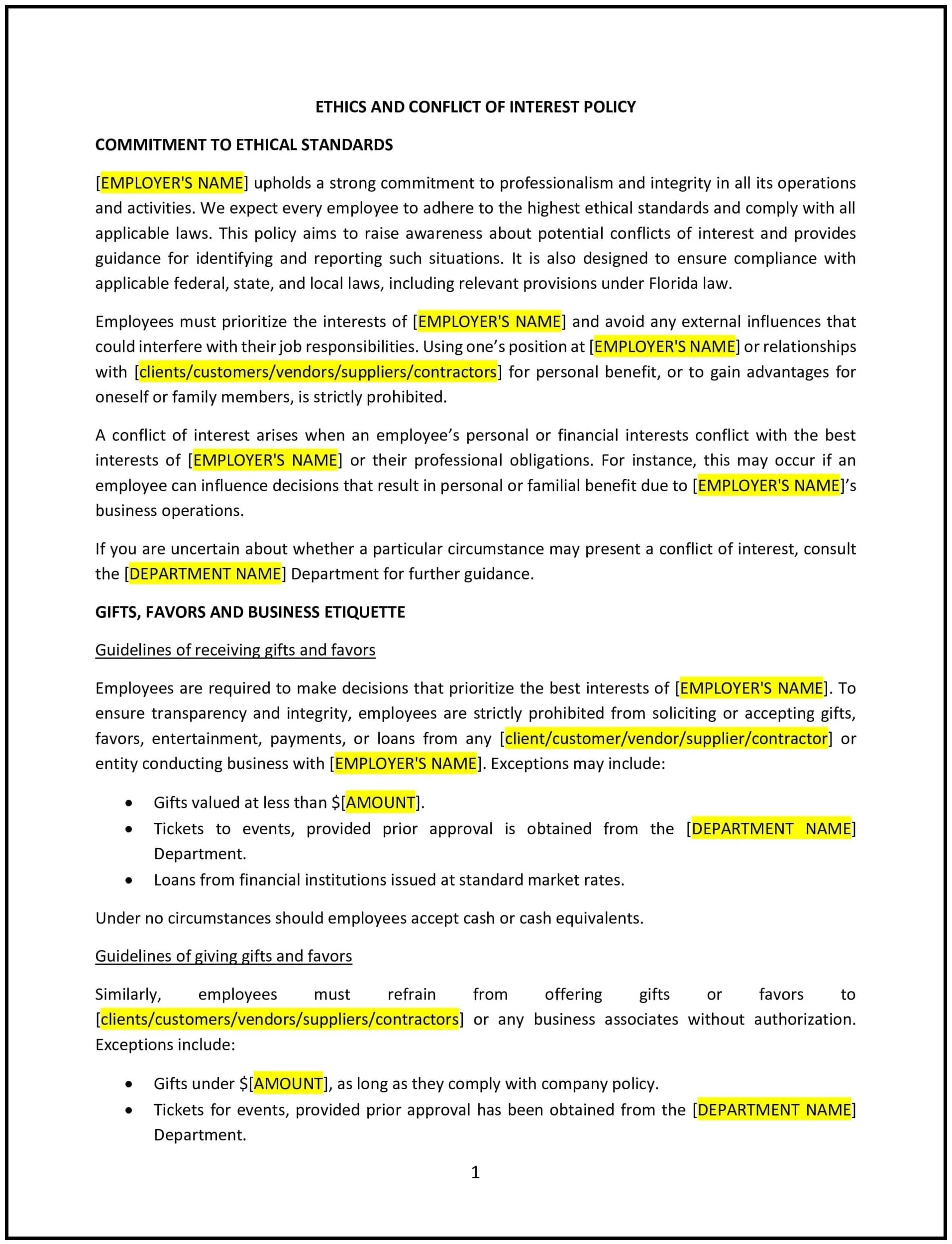Ethics and conflict of interest policy (Florida): Free template
Got contracts to review? While you're here for policies, let Cobrief make contract review effortless—start your free review now.

Customize this template for free
Ethics and conflict of interest policy (Florida)
An ethics and conflict of interest policy helps Florida businesses promote integrity and transparency by establishing clear expectations regarding ethical behavior and conflicts of interest. This policy outlines the standards for employees to avoid actions or situations that could compromise their objectivity, loyalty, or professional judgment. It defines what constitutes a conflict of interest, the procedures for disclosing potential conflicts, and the steps employees should take to resolve such conflicts.
By implementing this policy, businesses can maintain a high standard of ethical conduct, protect their reputation, and ensure compliance with legal and regulatory requirements, reducing the risk of unethical behavior or legal challenges.
How to use this ethics and conflict of interest policy (Florida)
- Define conflict of interest: Clearly define what constitutes a conflict of interest, including situations where personal interests, relationships, or financial stakes could interfere with the employee’s professional responsibilities and decision-making.
- Establish disclosure requirements: Require employees to disclose any potential conflicts of interest as soon as they arise. This could include conflicts related to outside employment, investments, personal relationships, or gifts that might influence their work. Specify the process for disclosing conflicts, including who to report to and how to submit the disclosure.
- Set guidelines for managing conflicts: Provide clear instructions for resolving conflicts of interest, which may include recusal from decision-making processes, transferring responsibilities, or divesting conflicting financial interests. Ensure that employees know how to mitigate or eliminate any potential conflicts.
- Address gifts and entertainment: Specify the rules around receiving gifts, entertainment, or other benefits from clients, suppliers, or other external parties, and establish thresholds for acceptable gifts or situations where gifts must be declined or reported.
- Implement a review process: Designate personnel or a committee responsible for reviewing disclosed conflicts and determining the appropriate actions. Ensure that conflicts are addressed promptly and fairly, maintaining transparency throughout the process.
- Promote a culture of ethical conduct: Encourage employees to raise concerns about ethical issues, conflicts of interest, or unethical behavior, and provide mechanisms for employees to report concerns without fear of retaliation. Reinforce the importance of maintaining ethical standards in all aspects of business operations.
- Ensure compliance with laws and regulations: Ensure that the policy is in line with Florida state laws, federal regulations, and industry-specific ethical standards. This may include the Foreign Corrupt Practices Act (FCPA) or other applicable laws governing business ethics and conflicts of interest.
Benefits of using this ethics and conflict of interest policy (Florida)
This policy offers several benefits for Florida businesses:
- Promotes integrity and accountability: By setting clear ethical standards and conflict of interest guidelines, businesses create a culture of transparency and integrity, ensuring that all employees act in the best interests of the organization and its stakeholders.
- Reduces legal risks: A well-implemented policy helps prevent legal issues related to conflicts of interest, such as bribery, corruption, or fraud. It ensures that business decisions are made objectively and in compliance with laws and regulations.
- Enhances company reputation: Businesses that maintain high ethical standards and address conflicts of interest appropriately strengthen their reputation among clients, customers, and partners, fostering trust and long-term relationships.
- Encourages employee confidence: When employees understand that the company takes ethics and conflicts of interest seriously, they are more likely to feel confident in their work environment and be motivated to act ethically.
- Mitigates financial risks: By addressing potential conflicts early, businesses can avoid situations that could lead to financial losses, legal penalties, or damage to the company’s brand.
Tips for using this ethics and conflict of interest policy (Florida)
- Communicate the policy clearly: Ensure that all employees understand the ethics and conflict of interest policy, its importance, and the process for disclosing conflicts. The policy should be included in the employee handbook and be easily accessible.
- Provide training: Offer training sessions for employees on recognizing conflicts of interest and understanding ethical behavior expectations. Training should include real-world examples and practical guidance on how to handle conflicts when they arise.
- Review disclosures regularly: Periodically review the disclosures submitted by employees to ensure that potential conflicts are addressed in a timely manner. Implement a process for handling conflicts fairly and consistently across all levels of the organization.
- Encourage open dialogue: Foster an environment where employees feel comfortable discussing ethical concerns or potential conflicts, knowing that the company will take their concerns seriously and handle them with discretion.
- Lead by example: Company leadership should model ethical behavior and demonstrate their commitment to resolving conflicts of interest transparently, setting the tone for the rest of the organization.